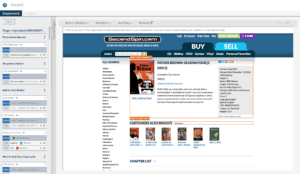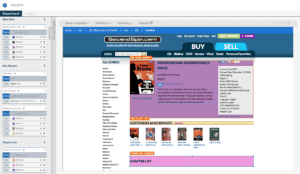A/B testing is good, but testing via an artificial intelligence-powered testing tool is even better when it comes to increasing web conversion, finds Chris McBride, vice president of product development and innovation at Trans World Entertainment.
The entertainment products retailer had mixed results with an A/B test on its site design with another vendor. Those lackluster results led the company in September 2017 to try out testing with artificial intelligence via AI technology vendor Sentient Technologies Holdings Ltd., which offers a tool, called Ascend, that enables merchants to quickly test thousands of different website design combinations to find the design that generates the best conversion rate.
Trans World Entertainment tested multiple combinations of its product detail pages on its FYE.com brand, which is an online retailer of entertainment products, such as goods relating to music, movies and TV.
FYE.com tested 77,760 different combinations of how its product detail pages looked, which increased conversion rates 18% in six weeks over the original.
With these great results, Trans World Entertainment shifted its focus to its SecondSpin.com brand, which sells used CDs, movies and games.
The retailer’s team and Sentient generated a list of suggestions that could improve conversion rate, such as where to place copy text, whether to have an Add to Cart button, plus the button’s shape and color, and whether to have a promotion banner. The retailer had 44 different elements it was testing with 12 values or variations of each element, for a total of 3,074 page layout “candidates.” And, while the test ran, it could also test new ideas.
Sentient aims to have 100,00 unique visitors see pages or about 3,000 conversions within a month, to generate the best results, say Jeremy Miller, vice president of marketing at Sentient.
After about four weeks, the retailer had a winning design that produced a 13% higher conversion rate over the current product detail page, McBride says. The page with the higher conversion was much cleaner, as it hid the promotional banner, removed product recommendations and featured a green checkout button.
“Less information helped to focus the customer on the task at hand,” McBride says, adding that the task at hand is hitting “add to cart” and buying the product.
Once the vendor determines which page has the highest conversion and Trans World Entertainment approves it, the retailers could change all of its product detail pages to the new template by the next day, McBride says.
Plus, during the month-long test, some of the page candidates had a 10.9% higher conversion rate over the current page. And so, the retailer drove traffic to one of these “candidate” pages to take advantage of the higher conversion, even though this candidate page was not ultimately the winner.

Two candidate pages SecondSpin.com tested.

In January, FYE.com switched to a new e-commerce platform, the Salesforce Commerce Cloud, and the retailer is in the process of optimizing its cart and checkout pages to see which combinations increase conversion. It also wants to test its home page, store locator and store detail pages, he says.
“We are hoping for similar success on the new platform,” says McBride, referring to the initial test on FYE.com’s previous e-commerce platform.
One of the main benefits of using artificial intelligence is testing multiple items at once, instead of doing tests in sequence, McBride says. This means that Trans World Entertainment gets to the net gain of a higher conversion rate much faster than doing several A/B tests back to back, which could take months instead of a few weeks, he says.
“The thing that was the most attractive to us was that we could get a larger number of ideas tested at one time,” he says.
The Sentient Ascend tool varies in cost per retailer depending on unique monthly visitors, and there is no implementation fee, Miller says.
Favorite